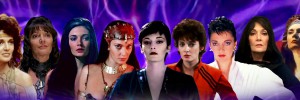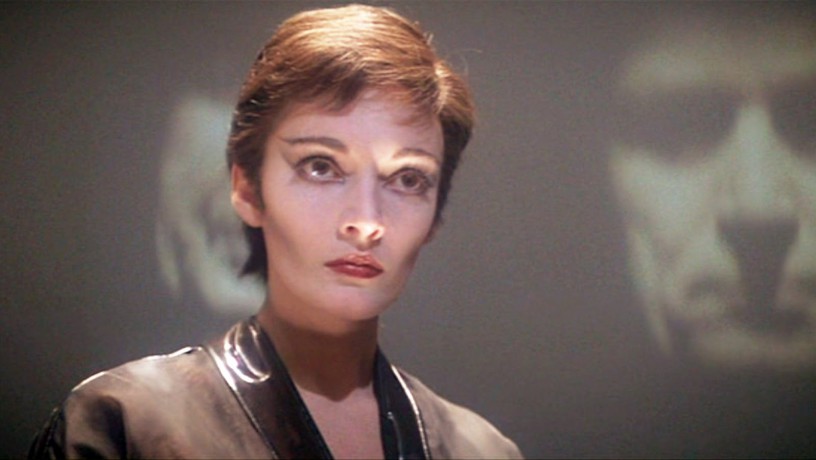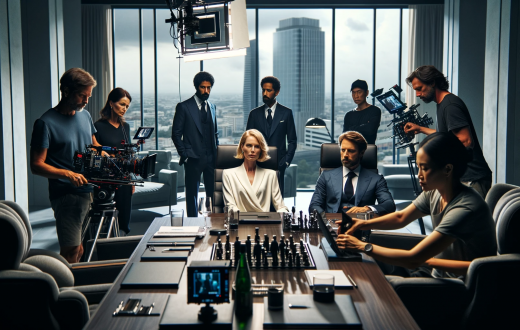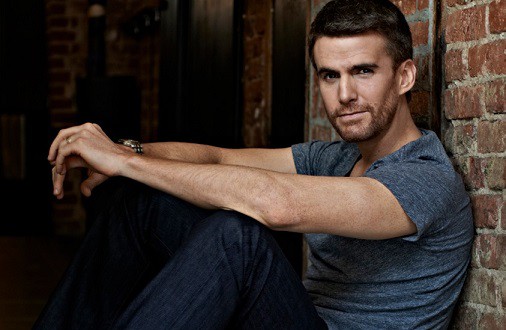Sarah Douglas, who played the Kryptonian anti-superhero Ursa in Superman and Superman II, had no idea that 42 years later, she’d still be approached on the street by fans wanting to discuss all things Superman.
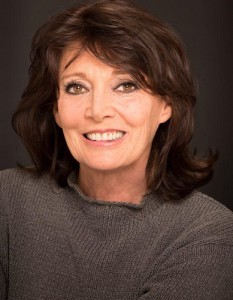
With nearly 50 years in show business, Sarah Douglas, who has also been prominent in a list of projects longer than New York’s Verrazzano-Narrows Bridge, has received, and now gives us through this interview, advice to aspiring actors.
As a bonus, we get to hear behind the scenes stories about Sarah Douglas’ Superman audition process, special effects such as flying, and of course, what kind of article would this be if we didn’t discuss super powers!
You’ve done a lot of fan conventions over the years and recently did your first virtual convention due to the COVID-19 pandemic. Did the virtual con have a different feeling than meeting fans in person? What was it like when someone purchased a block of virtual one-on-one time with you? Are there creepy fans?
Nothing compares to the real thing. Nothing compares to that hug and that squeeze and that big old smile that you get and also the interaction. It’s quite wonderful. I love my conventions and I love meeting the fans. The virtual convention? Yes, it does resolve quite a few things — it means that we *can* meet and say hello, but it’s not the same. My face will freeze, my chair will slip and I’ll disappear from the screen, the dog will bark… stuff happens! So it’s never quite the same — it’s better than nothing, but it’s not good enough. I want more. For those fans that are kind enough to have a private one-on-one, it’s not long enough. We just get talking — I love talking to the fans, but we only get five minutes or something like that and before you know it, the time has gone and we haven’t even started. I feel guilty because somebody else is charging them and making the money… I make a little bit of money, but the organizers make most of the money. There’s no relaxing of the rules, but I’m grateful for everything and very pleased to be able to talk to the fans. Are there any creepy ones? No, because the creepy ones are sorted out before they get to me… they’re policed and I think there are clues; somehow the organizers know who the creepy ones are, so it’s just one big love-fest for me!
Click here to watch the video of Sarah Douglas talking all about conventions!
You work all over, including the USA and your native UK where your professional career started. Do you need to belong to the SAG-AFTRA actors union to work in the USA? Do you belong to any other actors unions?
I do indeed have a green card; since 1983 I’ve lived in America, although now I’m much more based in England, especially due to Covid — I’ve been stuck here for the last year. I am a very proud member of SAG-AFTRA, that gives me a great deal of protection, you cannot work in America without being a member and you’d be crazy not to be a member. As far as England goes, I am a member of Equity and have been since I was about 19. I’ve never been overly thrilled with my union, it is now no longer a necessity to be a member in England — at the beginning you couldn’t work without being an Equity member and I’m talking about in the Seventies, for me. Nowadays anybody can do anything. Equity could have done a lot more for me. When I did “Superman” I did it under an Equity agreement because was in England — I was not yet a member of SAG (SAG & AFTRA were two unions that have combined their power — I was already in AFTRA which looked after more of the radio stuff). If I had been a member of the Screen Actors Guild and had a Screen Actors contract I would have been very protected. I certainly would have got residuals and made money from the endless screenings of “Superman” & the countless DVD’s/videos etc., but Equity didn’t accept it as a necessity back in those days — so I’ve never been that thrilled with Equity, but because I am a member I stick with it. They could do much better, though. Unions are somewhere to go to if you feel that you’re not being treated correctly or something is wrong, and again, SAG-AFTRA is a very strong union and thanks to them I have a pension and good healthcare; I’m very pleased — Equity could certainly learn a great deal from SAG-AFTRA.
I also would like to say that one of the things that’s made me most proud is that I’m a member of the Academy of Motion Pictures in America, which means I get to vote for the Oscars — I get to take part in that whole wonderful selection process and I take it very seriously. So between the Academy (AMPAS), BAFTA in England and SAG-AFTRA, that’s three different lots of voting that I do every year and it does mean that I am taking part in and observing what’s going on out there, because there’s certainly nothing going on here right now!
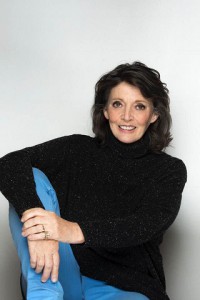
Any advice to aspiring actors?
When I was a young actress I was fortunate to have a very, very good agent and he encouraged me to accept pretty much every job that came my way. So I would advise any young aspiring actor to – throughout their career, really – not to turn their nose up at anything. Work is work, whether it be on radio or a small part in a film, especially at the beginning; everything you can do. I was fortunate enough to work on “Tommy” with Ken Russell; I had a very small part. I don’t even remember what it was, but I do remember that I had a lovely hat, but Ken Russell didn’t like the hat, so instead of just replacing the hat, he exchanged me for another actress who had a better hat! It was a learning experience… I certainly learned from that! I also was an extra for two weeks on “Rollerball” and was able to observe Norman Jewison directing and Jimmy Caan being a movie star… all sorts of experiences help mold you as an actor and a good work ethic is vital — the one thing I would absolutely, totally go with is punctuality. Timing. Whether it be for an interview, audition and certainly when you have a call-time on the set, always get there 10 minutes early just in case you get a flat battery or something happens to you and if it does, you phone in. Never be relaxed about timing. Timing is everything in every respect.
What was your audition like for the character of Ursa in “Superman?” When you got the job, did you have any idea you would be asked back for “Superman II?” Were you in a waiting room with other actors at your audition, waiting for your turn? How did you dress?
Firstly, the audition for “Superman” was for “Superman” I & II, we always knew that there were going to be two films back-to-back, not shot in sequence but all jumbled up and so I knew exactly what I was letting myself in for. I didn’t go into a waiting room nor see any other actors, I didn’t have any of that, because I was busy shooting a film called “The People That Time Forgot” over at Pinewood Studios and the meeting with Dick Donner was at Shepperton Studios, and so, because I was shooting all day long, they had to arrange for me to see him in the evening. My initial meeting was at about 8 o’clock in the evening and it’s rather a well-known story that I had eight separate appointments set up and eight times Richard Donner cancelled me or I was cancelled at the last minute, so I’d have a long day’s work and then I’d be ready to go off to audition and suddenly I’d find that I wasn’t going. On the eighth time, Mary Selway, who was the most brilliant, wonderful casting director (sadly no longer with us) said, “You must try and get there” (because I had already gone off the idea), “You must try, because this is so up your street – the perfect part for you.” And so I went along, this was the ninth time and I was kept waiting for twenty-odd minutes and I was just in a pissy mood, I was tired and cranky, I didn’t know anything about the character, but they were looking for someone with a mean streak and fortunately I had a mean streak that night, especially when I saw Dick Donner for the first time in his blue-tinted glasses and I thought “Who is this pretentious California director?”, so that was a good start! I had lots and lots of further meetings, I did one reading in a small room, I had to do some moves and act out a little scene, and of course the other actors (and I know that they saw hundreds of them) had to do it in a big space, but because I was only available in the evenings, we could do it in a small office, so there was a lot more impact from that. How I dressed was really rather sad, because I was so English I just went in wearing a leotard with my long hair tied back in a ponytail, with little sneakers on, looking terribly conservative and not at all Ursa-like, but obviously something got through.
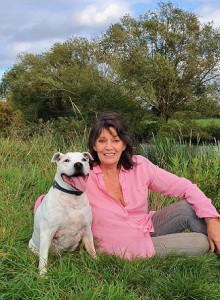
Special effects today are more advanced than they were when “Superman” was filmed in the late 70’s / early 80’s. What’s the biggest difference you’ve noticed, technology wise, between then and now?
It’s not even the biggest difference that I’ve noticed, I just think that we were the first people that proved that man could fly, even though once or twice you could see wires and a few odd moments looked a little bit Mickey Mousey, I think the effects back then were absolutely superb and we really did fly and nowadays it’s so advanced, anything is possible and half the time I’m not sure the actors are even there – I don’t think they are – we were there, we were hanging on the end of wires, we actually got into those scenes, they went to Niagara Falls etc. etc. whereas nowadays it would probably all be done in a studio, in post-production or with blue screen or whatever else, so I’m glad I was in the days that, although special effects were still pretty primitive, they were so much better than prior; there were points in “The People That Time Forgot” where there were TERRIBLE cardboard cutouts, with some very cardboardy dinosaurs (and cardboardy actors, actually!). So I’m quite proud of what we accomplished in Superman.
How were your “Superman” flying sequences put together? How’d they make you fly? Were you on a harness? Was there green screen? Were you scared to be hoisted into the air?
No, I wasn’t scared, I LOVED it! That was part of the audition process, whether or not I felt confident on the wires. Other actors had come in, rather like people say they can ride and they suddenly find themselves on a horse when they’ve never ridden before and they’re terrified – actresses were saying they weren’t scared of heights; when you came in and you were on the big set, up forty feet in the air and you were put on the end of that wire and left dangling there, you had to be very comfortable with that. And I was — I loved all of that, I thoroughly enjoyed jumping off window sills and flying to another spot.
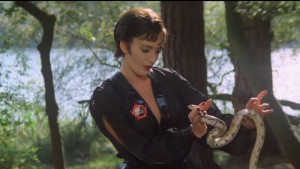 In “Superman II” there’s a scene where you’re handling a snake that “bites” you. Was that really you holding the snake? Tell us about that. Was there an animal trainer on set? Did you have any fears? You fry the snake with your eyes. What direction did the director give you, knowing you were going to have lasers coming out of your eyes? What did director say to you? Like, “Look angry and down at the ground?”
In “Superman II” there’s a scene where you’re handling a snake that “bites” you. Was that really you holding the snake? Tell us about that. Was there an animal trainer on set? Did you have any fears? You fry the snake with your eyes. What direction did the director give you, knowing you were going to have lasers coming out of your eyes? What did director say to you? Like, “Look angry and down at the ground?”
Yes, it was me holding the snake, I’ve held snakes in lots and lots of movies. I don’t recall there being an animal trainer on set, maybe there was, but I don’t know. And no, I had no fears, you know? I was 27 and I was absolutely gung-ho, I was game for anything, no fear of anything — I always go into the experience whole-heartedly… I don’t even remember that snake biting me, but I guess it did! Obviously it wasn’t following a script, but with the right director (and the right direction) I’ve always had complete confidence, sometimes to my detriment, especially on Superman – I had a couple of nasty injuries and also got some shots in my face from the scene in the President’s office, when we come through the White House ceiling and they’re firing into my face and of course, stuff happens on set and that was a particularly bad experience, because we had come back to resume shooting Superman II (it was about a year and a bit later on from when we initially started) and my understanding is that there was no armour on the set, the stuntman was there but the guns got laid down in the dirt somewhere and picked up a bit of dust, so when it was fired at me it actually shot some stuff into my face, which was very, very scary and the next time a gun was raised to my face (prior to that I had been quite comfortable with it) I went into complete shock and terror and to this day have never allowed that to happen again. But you know what, these producers will push you as much as they possibly can until you say no.
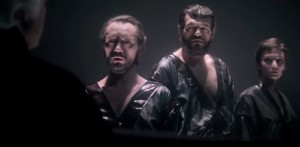 At what point did you meet your co-workers Terence Stamp and Jack O’Halloran? Did you know them before you started working in Superman? Did you get along?
At what point did you meet your co-workers Terence Stamp and Jack O’Halloran? Did you know them before you started working in Superman? Did you get along?
I met them on the first day. And how did we get along? It could not have been better and more fun and formed lasting friendships between all of us – in fact I’ve seen Terence Stamp , which was lovely – I hadn’t seen him for years, but Jack O’Halloran I see and speak to all the time, which is great!
Tell us about the costume fittings for Ursa.
I have no idea – I remember nothing about the costume fittings whatsoever! Yes, there were lots of different costumes, there were certainly lots of different boots – with a certain heel, or then you had to have a flat heel, if they were shooting from one angle you had to have the boots with the zip on the other side, etc. etc. – there were lots and lots of different boots. I know that my boots have been sold and people have spent an awful lot of money getting hold of them, but I hate to tell you that there are many, many boots floating around out there.
Did you have any idea, at the time, the impact you were going to make on society as the Kryptonian super villain, Ursa?
I was completely, totally, utterly oblivious. I can honestly say that I was unaware of the impact – I’ve only really “got it” in the last maybe 10-15 years, but before that I was oblivious to the power of Ursa and her impact on people and I still marvel at the interest that people have in her and the fact that people still want photographs and still want to talk about her.
How did you feel, as an actress, about having super powers? Or was it just a job? Did you discuss having super powers with anyone?
It was very much a job, it was seventeen months altogether (I think it was nine months and eight months, something like that) with a big break in the middle of about a year and a bit. Day-in, day-out, every day on the set, tedious and boring, wearing a wig and boots, hanging on the end of a wire all day – tedium… obviously some days were fun and fabulous, but this was an enormous budget film, it took days and days to get the first shot in and I certainly didn’t get that Ursa was any kind of sex symbol, at the time I was about to get married, I was all interested in that and getting a little house in the country – I had no idea of the power or the impact of Ursa. As I went around the world (one and a half times) selling the film for nine months (and in those days Warner Bros. really knew how to do it) – the movie opened first in Australia and then we went to New Zealand, Japan, South Africa… people were certainly intrigued and interested to meet me – I was the only one doing the publicity on “Superman II” – but I thought it was more to do with the fact that people couldn’t believe that I was Ursa, because in those days, aside from being deeply conservative, I didn’t turn up in leather or boots, or short-cropped hair, I turned up as a rather sweet little demure English rose and that, I thought, was the interest. I didn’t realize at the time, I had no idea! But I do now and believe me, I’m making the most of it!

Did I discuss the super powers with anyone at the time? No! I went to work in the morning at 5:30am, I got in my lovely car with my lovely driver, I moaned all the way up to the studio, I got into the make-up chair at 7am and they proceeded to do things to me endlessly. Spent the day sitting in my dressing room because often there wasn’t anything for me on the set, because there were so many stand-ins doing this and that; for a lot of the time I barely filmed anything and I never told anybody about my super powers – I don’t remember discussing it with a soul. You also have to remember that at the time Superman wasn’t as big a hero in England as in the USA – the English were excited about Brando coming over and we’re all Superman fans now, but back then, to us it was just a job. I was much more interested in talking about what was going on in my vegetable patch than what was going on at work!
Do you notice any similarities or differences in super villains with powers from other movies? Is there one redeeming quality that all super villains have?
No redeeming qualities, it’s just good to be bad isn’t it, we all know that! Although I am told that Carrie-Anne Moss had watched me and that had influenced her performance in the Matrix movies.
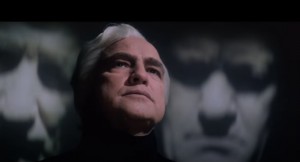
How was the It was the first English screening of Superman II: The Richard Donner Cut at the British Film Institute?
It was, for me, an enormous treat because I saw “Superman II: The Richard Donner Cut” in America and we had a big opening, The Directors Guild, a big red-carpet affair, lots and lots of press around 7/8 years ago and that was very nerve-wracking for me, because I was in Hollywood, I was back in front of all these people who wanted to see what Ursa looked like 25 years on, which was slightly intimidating – we then had to sit on the stage and talk. I loved watching the film but I really take it in. This time I was a real audience member, it was really comfortable, I was hanging out with friends and so I was able to sit in the audience and really watch the film and my goodness me, there were a lot of jokes I’d missed before and lots of little things in it – I really, really enjoyed it. Because unlike some people who seem to watch it over and over again, I really don’t – and obviously the Donner cut hadn’t been shown here before, but if Superman appears on television then yes, I watch it. Otherwise I don’t.
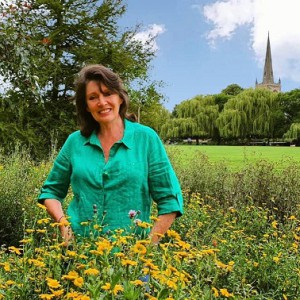
SARAH DOUGLAS BIOGRAPHY
Even though Sarah Douglas was born and raised in Stratford-Upon-Avon, and knew that she wanted to act, she did try to expand options available to her. She worked in a factory and for a time, also in a sterilizing department of a hospital. She briefly moved to France and also undertook a teacher training course in English and Drama. However, these were all abandoned in favor of acting. Soon after leaving Drama School, she won her first film role in The Final Programme as well as starring in the television series The Inheritors. Other work began to follow, including the television series Space: 1999 and the films The Brute and The People That Time Forgot. During the filming, the casting began for the science fiction blockbuster Superman. Sarah Douglas also portrayed the Commander Pamela in Kenneth Johnson’s epic television mini-series, V: The Final Battle. And the rest is history.
